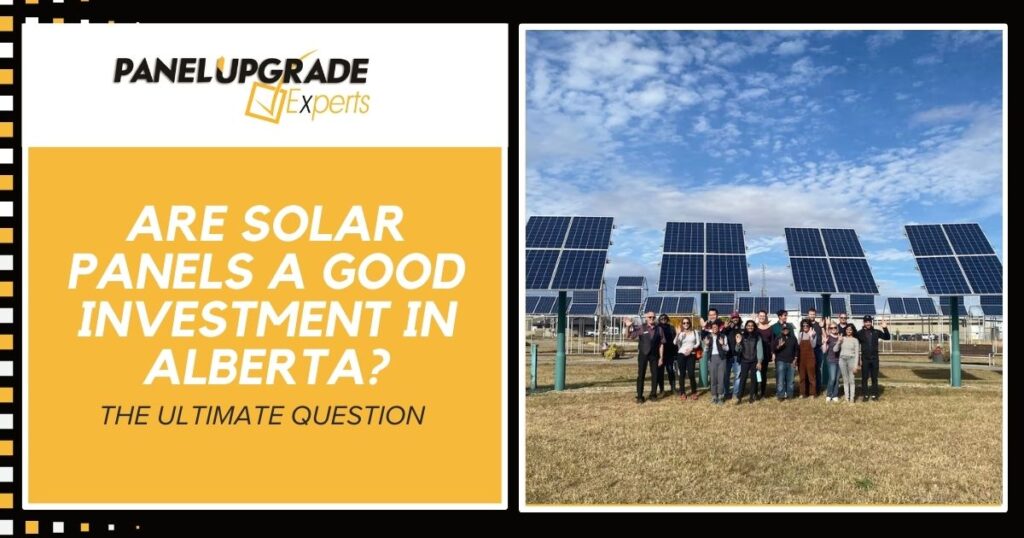Have you ever wondered if solar panels are worth it in Alberta? You might be surprised that even with its wintry reputation, the province can be a hotspot for harnessing solar power.
Back then, Alberta’s low electricity costs made solar energy seem unnecessary.
But since the early 2020s, Alberta’s electricity rates kept jumping until they reached 29-33 cents per kWh! While the current RRO rate has dropped, its unpredictability is undeniable, pushing residents to contemplate solar energy.
The good news is that Alberta boasts a solar power potential of 1373 kWh, especially during June and July, ranking it as one of the sunniest locations in Canada.
With such impressive solar radiation and inevitable electricity price hikes, solar panels are becoming a new light.
So, are solar panels a good investment?
That’s exactly what we’re going to explore in this blog.
We’ll delve into why investing in solar energy could be a game-changer and provide some practical steps for you to start.
Stick with us as we uncover the benefits of going solar in Alberta and how it could be a bright idea for your future.
What Are The Basics Of Solar Panels?
Solar panels harness the sun’s energy to generate dependable, clean electricity that homes, businesses, farms, and even vehicles can use.
Commonly installed on rooftops, these panels are made up of photovoltaic (PV) cells that convert sunlight into electricity. There are two main types of PV cells used in solar panels: monocrystalline and polycrystalline.
Regardless of the type, their function is the same: turning sunlight into energy.
Over the years, solar panel technology has made significant technological advancements. This includes the development of thin-film and perovskite solar cells.
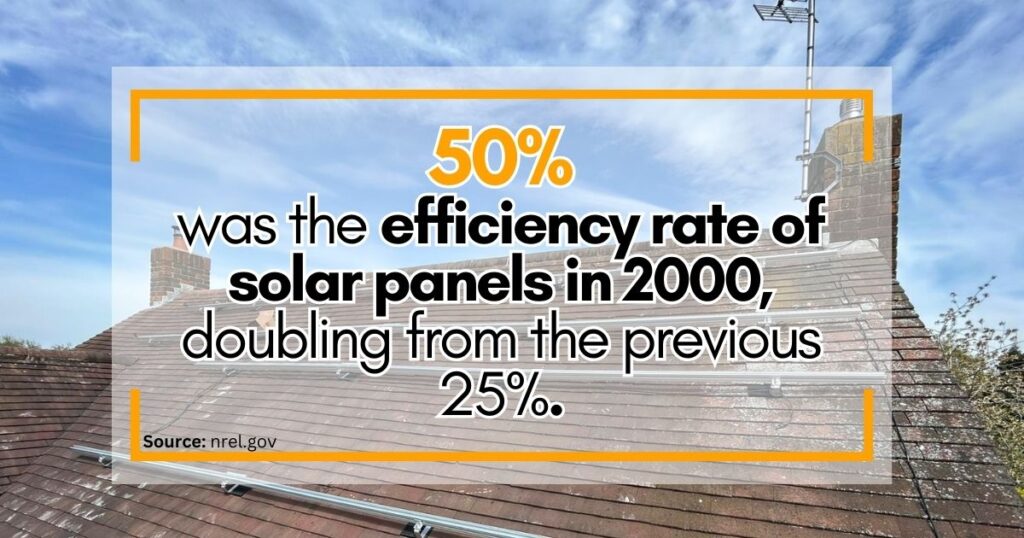
These improvements have made solar power generation more productive yet affordable. While panels are becoming lighter and thinner, efficiency rates have almost doubled, from 25% in 2000 to nearly 50% recently.
So, what’s next for residential and commercial solar power? The continuous improvement in solar technology indicates a promising future for solar energy and more reasons why solar panels are worth it.
What Makes Solar Panel Investment Worth It?
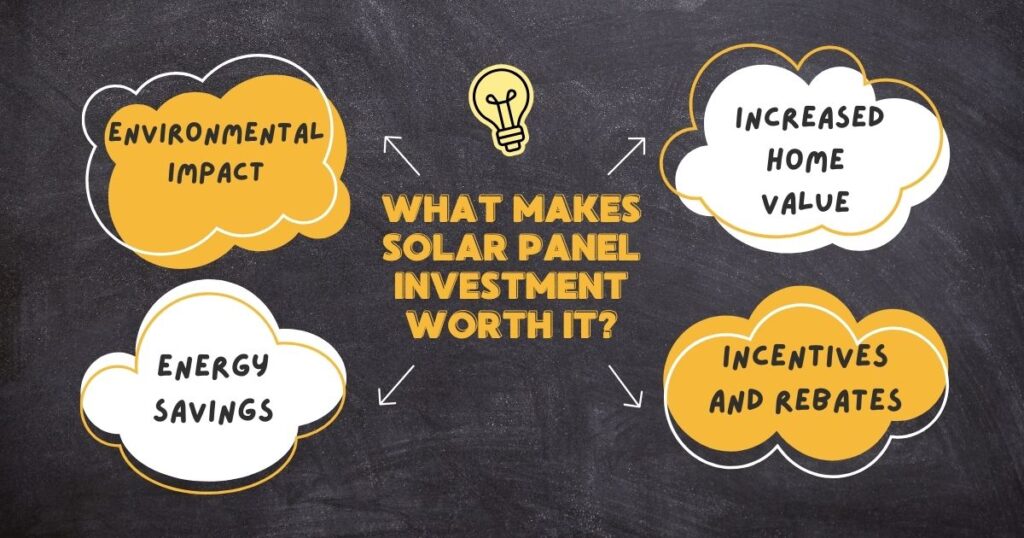
Before investing in solar panels, it’s crucial to understand their benefits. Knowing these advantages helps you make an informed decision. Here are the key benefits of adopting solar panel technology:
1. Environmental Impact
Solar energy offers significant environmental benefits. One is reducing carbon emissions.
Since solar panels convert sunlight into electricity through photovoltaic cells, they provide a clean, emissions-free power source with a low carbon footprint.
For an average household, using solar energy is like cutting car emissions by 19,316 miles a year, planting 125 trees, or avoiding 8,440 pounds of coal usage.
2. Energy Savings
A few factors can affect your savings with solar energy. These include your location, your home’s energy usage, the size of your solar installation, and your current electricity costs.
Start estimating your savings by subtracting your solar expenses from what you would have paid for conventional electricity.
For instance, if your monthly electric bill is $200, you could save about $75,000—an amount near what most solar users already save over a system’s 30-year lifespan. Note that electricity costs can vary and rise, so it’s vital to understand local rates.
Finally, depending on your location and utility provider’s specifics, you can sell surplus solar electricity back to the grid through net metering.
3. Increased Home Value
Research from the National Renewable Energy Laboratory suggests that homes with solar installations sell quicker and at higher prices—about 20% faster and 17% more than homes without solar.
It means that for every dollar you save on energy through your solar setup, your home’s value could increase by $20. So, let’s say you’re saving $700 annually on your energy bills through solar. You could see a $14,000 uptick in your home’s market value.
Real estate experts acknowledge this trend, noting that homes with solar panels are more attractive to buyers, aligning with the 67% of buyers in a Zillow report who prioritize energy efficiency.
In addition, a Lawrence Berkeley National Laboratory study highlights that buyers are willing to pay an extra $15,000 for a solar-equipped home. On average, a solar home can fetch 4.1% more value at sale time, translating to an additional $9,274.
As more people seek sustainable and cost-effective homes, the value and appeal of houses with solar panels in the real estate market are increasing.
4. Incentives and Rebates
In Alberta, homeowners and businesses keen on switching to solar energy have a variety of incentives at their disposal, even with the province’s main solar program now obsolete.
For instance, Edmonton’s Home Energy Retrofit Accelerator program provides significant support, offering $0.40 per watt for solar installations, effectively subsidizing around 15% of the initial costs.
Across Alberta, municipalities generally provide incentives up to $0.70 per watt, capping at $5,000. It’s wise for homeowners to research and tap into these overlapping benefits for maximum savings.
With the Light Up Alberta – Solar Club Loyalty Program, you can get better rates when you sell extra energy back to the grid and even get cashback when you use energy from the grid.
Businesses can also participate in the Solar Offset program, which encourages them to work with solar panel owners to help the environment and make money through carbon offset credits.
Emissions Reduction Alberta offers considerable funding to businesses for green upgrades, underscoring a commitment to sustainable and cost-effective energy practices.
Are Solar Panels A Good Investment?
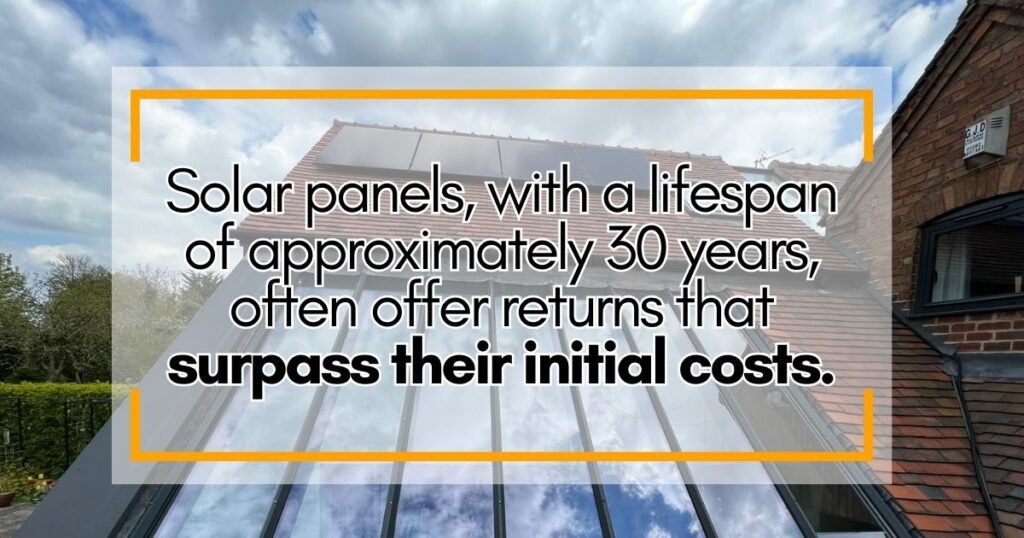
Consider solar panels a long-term investment that accrues value over time, similar to how interest grows.
Their worth is evident through the consistent generation of electricity. The savings on your electricity bills could also outstrip what you’d mostly pay for grid power.
Thanks to net metering, your savings could be even higher. Since solar panels can last around 30 years, they promise a return that often exceeds the upfront cost.
Understanding the full financial benefits requires figuring out your specific payback period.
Factors like local energy prices, the amount of sunlight your area receives, and your energy consumption patterns will influence when to break even.
Typically, solar systems become cost-effective in about ten years and continue to provide free electricity for many more years.
When Are Solar Panels Not Worth It?
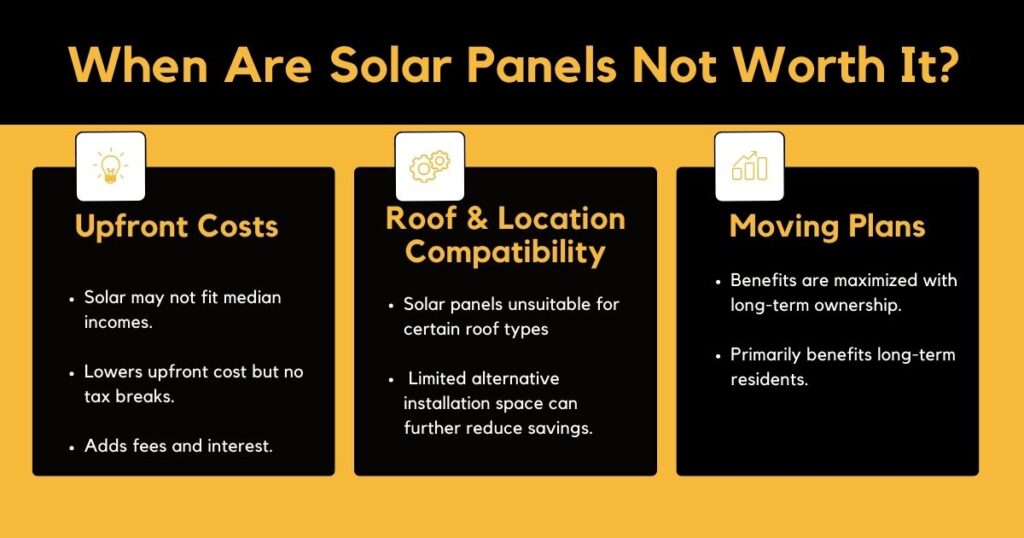
Although investing in solar panels offers numerous advantages, there are situations where they might not be the best choice for a homeowner. Below are straightforward looks at when solar panels might not be worth the investment.
1. Upfront Costs
If you are a median-income earner, the upfront cost of solar panels may not be affordable. Leasing and financing may also disqualify you from tax benefits, along with extra fees and interest.
2. Roof and Location Compatibility
Solar panels are not ideal for homes with old, small, shaded, or poorly oriented roofs, as they might underperform, much worse if the property lacks alternative installation spaces like carports or yards.
3. Moving Plans
Reconsider investing in solar panels if you’re renting or plan to move soon. Solar installations are meant to be permanent, requiring costly and complex relocation. Also, the increase in home value is only beneficial if you stay long enough to recover the upfront costs.
How To Maximize Your Solar Panel Investment In Alberta
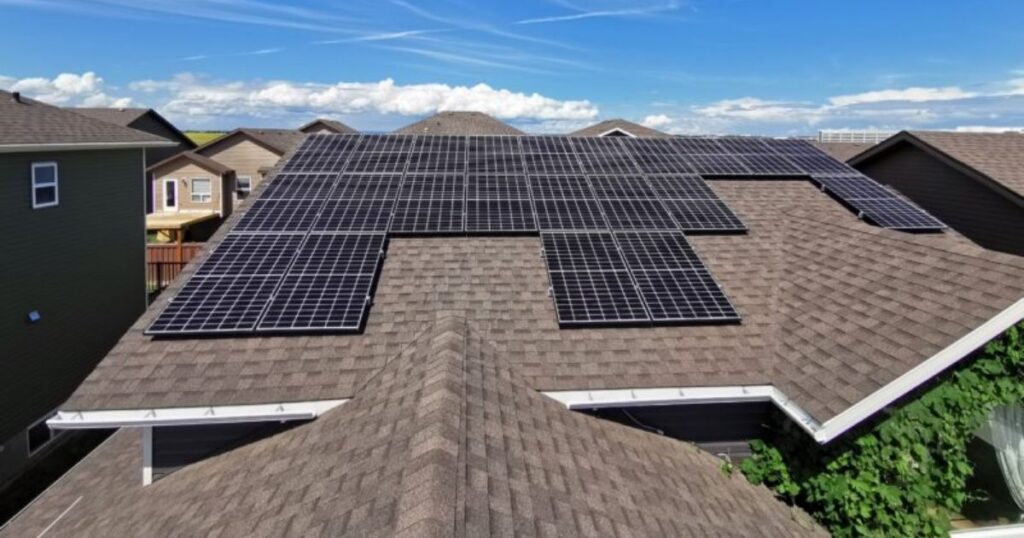
Maximize your solar panel investment in Alberta by assessing your energy needs and choosing the right system size. Opting for high-efficiency panels is crucial, as they perform optimally across Alberta’s varied weather conditions.
Place panels at an optimum angle to maximize the capture of sunlight. Consider investing in a battery storage system for backup energy during nighttime or low-production days. Maintain and monitor your panels regularly to ensure they operate efficiently.
Utilize Alberta’s net metering program and provincial and federal incentives to reduce upfront costs and offset your energy bills.
Finally, work with a trusted local installer who can customize your system for Alberta’s specific solar conditions, ensuring you get the most out of your investment.
Invest With Panel Upgrade Experts
Investing in solar energy represents a significant financial commitment, and many Alberta residents ponder the viability of solar panels as a worthwhile investment. Are you one of them?
At Panel Upgrade Experts, we specialize in guiding locals through the complexities of solar energy investment, offering expert advice tailored to Alberta’s unique conditions.
Our team has the knowledge and experience to help you make a wise solar decision. Together, we can explore the potential of the province’s sunny side and make solar panels worth the investment.
Final Thoughts
So, are solar panels a good investment? The short answer is yes!
But while solar panels are great, you should recognize that they may not be the ideal solution for every individual or situation.
In Alberta’s active solar market, it’s important to undertake detailed research to understand how solar energy fits your personal and financial situation.
Understanding the commitment involved is essential, considering both the advantages and potential downsides, such as initial costs, home suitability, and the need for long-term planning.
But with increasing efficiencies, decreasing panel costs, and rising traditional energy prices, solar investments are becoming more compelling.
Take the next step with Panel Upgrade Experts, exploring the promising horizons of the solar energy transition in sustainable Alberta.
FAQs
What are the financial advantages of solar panels?
Solar panels reduce electricity bills and correlate with system size and usage. They can increase property values and hasten home sales. Some governments also offer incentives and rebates. Additionally, they offer homeowners energy independence, safeguarding against fluctuating energy prices.
How long do solar panels last?
Solar panels typically last between 25 and 30 years. However, while they continue to function after this time, their energy production capacity may decrease gradually.
How much are solar panels?
The price of solar panels varies widely depending on factors like panel type, system size, location, and installation complexities. On average, residential solar panel systems can cost between $15,000 and $25,000 after tax credits and incentives.
What are the downsides of solar panels?
Solar panels have significant upfront costs, though prices are decreasing. Their energy output varies with weather and daylight, posing reliability issues in some areas. Installation requires ample space, which may limit use on smaller or shaded properties. Additionally, optimizing energy usage may necessitate costly storage solutions.

